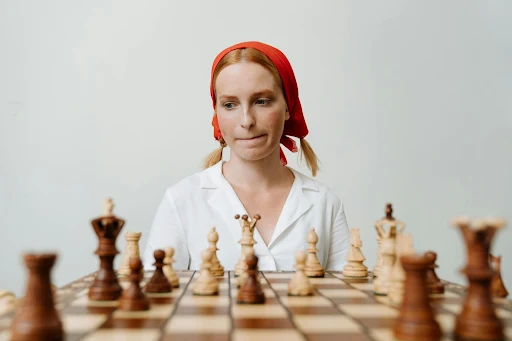is a game of strategy, intelligence, and patience. Often referred to as the "Game of Kings," chess has a rich history dating back over a thousand years. Whether you're a beginner learning how the pieces move or a grandmaster planning ten moves ahead, chess offers endless depth and intrigue. In this article, we’ll explore the history, rules, benefits, and global impact of chess.
A Brief History of Chess
Chess originated in northern India around the 6th century AD. Known as chaturanga, the early form of the game featured pieces similar to modern-day pawns, knights, bishops, and rooks. As the game spread to Persia, it became known as shatranj. After the Islamic conquest of Persia, chess reached Europe, where it evolved into its modern form during the 15th century.
In medieval Europe, chess was popular among the nobility, symbolizing strategic thinking and military skill. Over the centuries, the game grew in popularity, leading to the formation of chess clubs and international competitions.
The Rules of Chess
Chess is played on an 8x8 square board with 64 alternating light and dark squares. Each player begins with 16 pieces:
1 King
1 Queen
2 Rooks
2 Bishops
2 Knights
8 Pawns
The objective is to checkmate your opponent's king, meaning the king is under threat of capture and cannot escape.
Movement of Pieces
King: Moves one square in any direction.
Queen: Moves diagonally, vertically, or horizontally any number of squares.
Rook: Moves vertically or horizontally.
Bishop: Moves diagonally.
Knight: Moves in an "L" shape — two squares in one direction, then one square perpendicular.
Pawn: Moves forward one square, captures diagonally, and can move two squares on its first move.
Special moves include castling, en passant, and pawn promotion, which add strategic depth.
The Strategy Behind Chess
Chess is more than just moving pieces; it’s about planning, foresight, and adapting to your opponent. Strategy in chess can be broken down into several key phases:
1. Opening
The opening phase sets the stage for the entire game. Players aim to control the center, develop their pieces, and ensure the safety of their king. Popular openings include:
Ruy López
Sicilian Defense
Queen’s Gambit
King’s Indian Defense
2. Middlegame
The middlegame is where tactics come into play. Players look for combinations, threats, and weaknesses. Techniques like forks, pins, and skewers are used to gain material advantage.
3. Endgame
In the endgame, with fewer pieces on the board, every move becomes critical. King activity becomes vital, and players often rely on deep calculation to secure a win or force a draw.
Benefits of Playing Chess
Chess is not just a pastime; it offers numerous cognitive and psychological benefits:
Improves Memory
Chess players must remember openings, tactics, and positions. Studies show that regular chess play enhances both short-term and long-term memory.
Enhances Problem-Solving Skills
Each move in chess is a problem that needs solving. The game teaches players to think critically and consider multiple outcomes.
Boosts Concentration
Chess demands full attention. A momentary lapse can lead to defeat, encouraging players to stay focused.
Teaches Patience and Discipline
Games can last for hours. Chess trains the mind to be patient and disciplined, traits useful in all aspects of life.
Encourages Creativity
With millions of possible positions, chess offers endless room for creative play. Players develop their own styles and strategies.
Chess in the Digital Age
The digital revolution has significantly impacted chess. Online platforms like Chess.com, Lichess, and Chess24 allow players from around the world to compete instantly. Features like puzzles, lessons, and live commentary have made learning and playing chess more accessible than ever.
Additionally, chess engines like Stockfish and AlphaZero have changed how we understand the game. These programs analyze millions of positions per second, offering insights beyond human capability.
Famous Chess Players
Chess has produced many legendary players who have left their mark on the game's history.
Garry Kasparov
Considered one of the greatest chess players of all time, Kasparov was World Champion from 1985 to 2000. His aggressive style and deep preparation set new standards.
Bobby Fischer
An American prodigy, Fischer became World Champion in 1972, breaking Soviet dominance in the sport. His match against Boris Spassky remains one of the most famous in chess history.
Magnus Carlsen
The reigning world champion (as of 2024), Carlsen is known for his versatility and endgame mastery. He became a grandmaster at the age of 13 and has held the world number-one ranking for over a decade.
Chess Tournaments and Competitions
Chess tournaments range from local events to international championships. The most prestigious event is the World Chess Championship, held every two years.
Other major tournaments include:
Candidates Tournament – Determines the challenger for the world title.
Tata Steel Chess Tournament
Sinquefield Cup
FIDE Grand Prix
Online tournaments have also gained prominence, especially during the COVID-19 pandemic, bringing new audiences to the game.
Chess in Education
Many schools have integrated chess into their curriculum due to its cognitive benefits. Programs like Chess in Schoolsand First Move have shown that chess can improve academic performance, especially in math and reading.
Countries like Armenia and India have national policies promoting chess education. Studies suggest that children who play chess perform better on standardized tests and demonstrate improved behavior.
Variants of Chess
To keep things fresh, many enjoy playing chess variants — modified versions of the game with different rules or boards.
Popular variants include:
Blitz Chess – Fast-paced games with 3–5 minutes per player.
Bullet Chess – Ultra-fast games with 1 minute per player.
960 (Fischer Random Chess) – Starting positions of pieces are randomized.
Bughouse – Team-based chess with captured pieces passed to a teammate.
These variants challenge traditional thinking and offer new ways to enjoy the game.
The Rise of Chess Streaming and Influencers
Chess has become a popular form of entertainment on platforms like Twitch and YouTube. Streamers such as Hikaru Nakamura, GothamChess (Levy Rozman), and BotezLive have millions of followers.
Their engaging content, from speed runs to educational videos and online matches, has brought chess to younger audiences, blending competition with humor and personality.
Chess as a Lifelong Journey
One of the most beautiful aspects of chess is that you never stop learning. Whether you're an amateur playing casually or an aspiring master studying game theory, there's always something new to discover.
Chess can be a solo pursuit or a social activity, a relaxing hobby or a competitive obsession. It adapts to your lifestyle, offering challenges that evolve with your skills.
Conclusion
Chess is more than just a board game; it’s a global phenomenon with deep cultural, educational, and psychological significance. It sharpens the mind, builds character, and connects people across generations and borders.
In an age of distractions, chess offers a rare opportunity to slow down, think deeply, and engage in meaningful competition. Whether you play for fun, growth, or glory, the world of chess welcomes you with open arms.





No comments:
Post a Comment